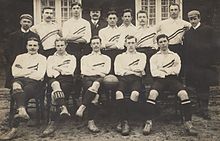Purely boomsma
Reinder "Rein" Boomsma (born June 19, 1879 in Schagen ; † May 26, 1943 in Hamburg-Neuengamme , German Empire ) was a Dutch soldier and, as a football player, one of the first eleven national players in the Netherlands .
life and career
In the club
Boomsma moved with his parents to Rotterdam as a child , where he graduated from the hogere burgerschool in 1896 . Like most of his generation, the boy first played football on the street before joining various clubs - the stations were called Minerva, Constantia and Achilles. In 1894 he met Kees van Hasselt , who played for Sparta and was also the organizer of the soccer team. Boomsma joined the club, where he established himself as a more accurate right winger in the first team. He was active until 1907, in 1908 he was made an honorary member. Among other things, he played in the first charity match in the Netherlands: The proceeds from the Spartas league game on October 29, 1899 against RAP Amsterdam, who had won the Eerste class West three times in a row , went to the Dutch Transvaal Committee; a little more than 1200 guilders supported the war of the Boers under Ohm Krüger against the British in South Africa. Boomsma scored the only goal of the game.
National team
On April 30, 1905, Boomsma, like his teammate from Sparta, Bok de Korver , was a member of the Dutch national team put together by Kees van Hasselt , which played the first official international football match in the country's history. In Antwerp , the team won 4-1 against hosts Belgium . In the second leg two weeks later on May 14, 1905 in Rotterdam, which the Netherlands won 4-0 against Belgium, Boomsma was also part of the squad. However, these two games remained the only appearances in the national team.
Military career and death in the concentration camp
Boomsma joined the Dutch army as a volunteer as early as 1895 and soon after became a professional soldier. He had eight children with his wife Gerdadina, whom he married in 1909.
As a professional soldier, Boomsma was a major garrison commander in Nijmegen in the early 1930s , later, from February 1937 with the rank of colonel , until November 1938, commander of the 15th Infantry Regiment in Apeldoorn . During the mobilization in 1939 the pensioner was reactivated; After the attack by the German Wehrmacht , Colonel Boomsma was able to bring his regiment from Assen to Rotterdam to defend the city under adverse circumstances. After the surrender he became active in the Dutch resistance ; he was regional head of the Ordedienst , the resistance organization of former military personnel. After denunciations, he was imprisoned twice in 1941 and 1942 by the Germans in the Oranjehotel prison in Scheveningen for a total of almost twelve months . In October 1942 he was arrested again and held in Utrecht , from March 1943 in Kamp Vught . On May 4, 1943, he was taken to the Neuengamme concentration camp , where he died three weeks later.
Because of his merits, he was made a knight of the Orde van Oranje-Nassau .
Web links
Individual evidence
- ↑ The sum corresponds to a purchasing power of almost € 15,000 in 2008; calculated with the purchasing power converter Waarde van de gulden / euro of the Internationaal Instituut voor Sociale Geschiedenis
- ↑ Boomsmas international match statistics at Voetbalstats.nl
- ^ Reinder Boomsma (1879–1943) , family tree at Genealogie Online
- ↑ History of Nijmeegsche Schoolvereeniging at Noviomagus.nl, spotted 26 January 2010
- ↑ a b Memorial Book of the Oranjehotel , viewed on September 17, 2013
| personal data | |
|---|---|
| SURNAME | Boomsma, Rein |
| ALTERNATIVE NAMES | Boomsma, Reinder (full name) |
| BRIEF DESCRIPTION | Dutch football player and resistance fighter |
| DATE OF BIRTH | June 19, 1879 |
| PLACE OF BIRTH | Beating |
| DATE OF DEATH | May 26, 1943 |
| Place of death | Hamburg-Neuengamme |
